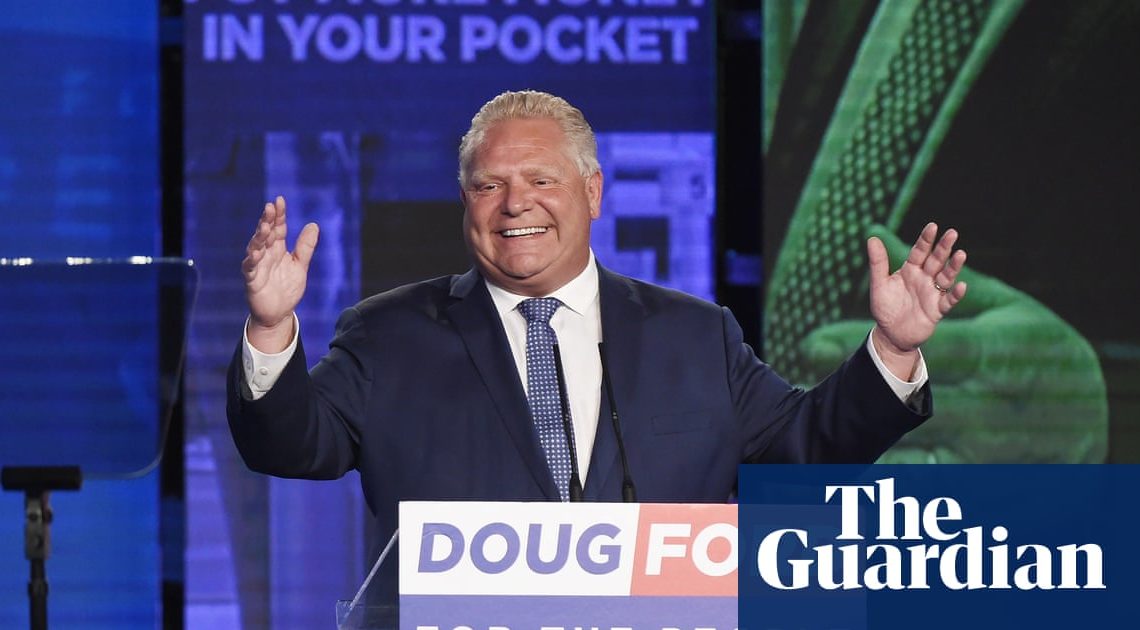
Canada: why Doug Ford is kryptonite for Conservatives’ election hopes
October 14, 2019Ontario premier, whose stock as an electoral asset has plummeted as the party struggles to build momentum outside their base, has been compared to Trump

When a brash businessman-turned-politician won a majority government in Canadas most populous province in 2018, Conservatives in the country wondered if they could ride a similar populist wave to national victory in this years general election.
Promising to slash income tax, cut fuel prices and repeal carbon pricing, Doug Ford took 41% of the vote and ended 15 years of Liberal rule in Ontario.
In the weeks after his win, Conservative leaders flocked to his side, bathing in reflected electoral glory and speculating that similar tactics might take them to victory over Justin Trudeau.
But as the federal election draws near, Canadas Conservatives have adopted a very different tactic: avoiding Ford at all costs.
In less than a year, Fords stock as an electoral asset has plummeted: the Conservative leader, Andrew Scheer, hasnt appeared at a single campaign event with the premier, even when canvassing in Fords own neighbourhood.
Meanwhile, the Conservatives have struggled to build momentum outside their base. Scheer has failed to draw crowds to his campaign events, and has been forced to defend past remarks on same-sex marriage and abortion.
And even after the prime minister became entangled in two scandals ethics violations and images showing him in racist blackface, polls show Scheer and Trudeau locked in a dead heat. Conservative strategists worry that Scheer has failed to galvanize voters and that Ford has become so toxic that he is hampering the partys chances of forming a government.
As recently as late spring, Conservatives were basking in poll numbers that put them comfortably ahead of Trudeaus party.
And in Ontario where the Conservatives were overturning the legacy of an unpopular Liberal provincial government the federal party was confident they had a strong ally.
Ford was a relatively new face to mainstream conservative politics: his early political career was overshadowed by his younger brother Rob, the notorious former Toronto mayor who admitted smoking crack while in office.
Despite several years as a city councillor, the elder Ford only entered provincial politics after his brothers death, and his candidacy was initially viewed with skepticism.
But his blunt language and appeal to the common folk soon drew comparisons with Donald Trump. And after he became premier of Ontario, Ford was quickly elevated to celebrity status within conservative circles, often appearing with Scheer at party events.
Im putting the prime minister on notice, Ford told a cheering crowd last year. Justin Trudeau, youre next.
In recent months, however, Ford has experienced a stunning reversal of fortune. His government has been dogged by protests over steep cuts to education, patronage scandals and looming labour strikes.
Ford has also gone to war with the federal government over a carbon tax, spending millions on a legal fight the majority of Ontario residents oppose. His approval rating has dropped to 25%, making him the second-most disliked premier in the country.
He came in really wanting to quickly undo a lot of the signature policies of the previous government, said Omar Yan Khan, a political strategist in Toronto.
[Fords government] have been getting quite a bit of blowback from some of those decisions and its led to a little bit of buyers remorse on the part of many in the Ontario electorate.
A recent poll from the Angus Reid Institute found that 85% of Ontario says the policies and actions of Fords government would make them less likely to vote for Scheers Conservatives in the federal election and 71% suggested it would direct them towards the Liberals.
Because of Ontarios electoral weight, it is virtually impossible for a party to win a general election in Canada without success in the province.
Conservatives have traditionally done well in the regions rural areas, but the 21 October election is likely to hinge on the ethnically diverse suburbs of Toronto, a suburban sprawl known as the 905 (for its dialing code).
905 voters can be fickle: they granted the Conservatives a majority in 2011 only to snatch it back in 2015, when Trudeau swept the province.
Earlier this year, the Conservatives held a 10-point lead over the Liberals in Ontario but that has now become a 10-point deficit, driven largely by Fords unpopularity, said Frank Graves, head of polling firm Ekos Research. Thats an enormous transfer of seats from one side of the ledger to the other, he said.
The cold math of parliament suggests Scheer, who has no viable allies on the right, needs to win an outright majority to have any hope of forming a government.
Anything short of this allows Trudeau to strike deals with left-of-centre parties to stay in power.
Ontario is now turning into something of a political proxy war, said Shachi Kurl, executive director at Angus Reid. And Scheer is dealing with the Ford factor, which is a drag on the Conservatives political fortunes.
Before Trudeau swept to power in 2015, the Conservatives governed Canada for nearly a decade and they retain immense support in rural areas and the western heartlands of the countrys oil industry.
But in an election taking place amid a climate emergency and rising income inequality, the partys pledge to quash carbon pricing legislation and cut taxes have not resonated with voters.
Meanwhile, Scheer, who narrowly won control of the party in 2017, has struggled to carve out a distinct identity, lacking the charisma and name recognition of Trudeau.
Eager to capitalize on Conservative weaknesses in Ontario, Trudeau has taken to mentioning Ford every at every opportunity so much so that at the last leaders debate on Monday, Scheer accused the prime minister of being oddly obsessed with provincial politics.
But in a tacit admission that Ford is electoral kryptonite, the Conservatives recently took the unprecedented step of parachuting in a different Conservative premier to campaign in Ontario. Over the weekend, the Alberta premier, Jason Kenney, toured the south of the province, stumping for Scheer. Ford was nowhere to be seen.
Read more: http://www.theguardian.com/us

